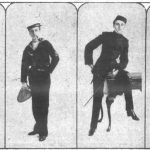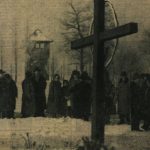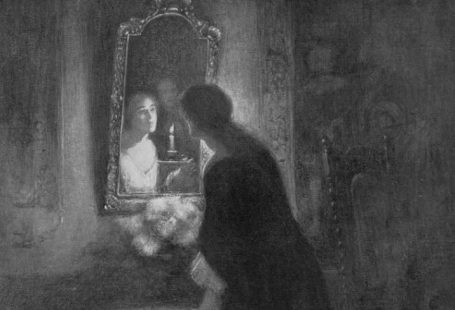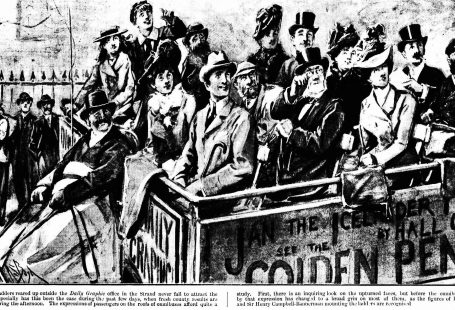This week we are celebrating St Patrick’s Day at The Archive, and we are delighted to announce that we have added nine brand new titles from Ireland and Northern Ireland to our collection, with 114,690 brand new pages added over the past seven days.
So read on to discover more about our new Irish titles, from Belfast to Cashel, from Fermanagh to Mayo, which also incorporate a specialist sporting title, and a bankruptcy one. This week we shall also be looking at the craze for women’s cycling in the 1890s, as we continue to celebrate women’s history throughout the month of March.
Register now and explore the Archive
Let’s begin in Belfast, with the Belfast Weekly Telegraph. First published on 28 February 1873, and appearing every Saturday priced at one penny, this newspaper devoted ‘itself to the development of sound Protestant and Constitutional opinions, to the advancement of religion among the masses of community, and to the cultivation of free and independent thought amongst its readers.’
The first edition of the Belfast Weekly Telegraph addresses ‘the pleasant venture’ of producing the new weekly newspaper, and what the new publication hoped to achieve:
…it must be admitted, that in both town and country, the public required a cheap and carefully selected Family Newspaper, giving the news of the week in a condensed form; not full of long and dreary reports which nobody has time to peruse; but terse, crisp and to the purpose.
Belfast Weekly Telegraph | 17 February 1900
It goes on to makes both its religious and political purposes clear:
The ‘Weekly Telegraph’ will be an exponent of Protestant principles in the best sense of the term. Civil and religious liberty within the bounds of the Constitution it will maintain. It shall do no wrong to our fellow-subjects of other denominations, but it will oppose every scheme having a tendency to destroy the safeguards of Protestant liberty. It will show a bold front to the games of Revolution and Republicanism, it will foster the Orange Institution as a political home of immense importance for good, and it will endeavour to cement the Conservative Party of Ulster in a powerful brotherhood.
Furthermore, within the pages of the Belfast Weekly Telegraph you could find local news, correspondence, poetry, serialized fiction (with stories like An Ocean Waif), news from Belfast Police Court and the latest wills and bequests.
We move now to Dublin for our next new title, the Evening News (Dublin). First published on 18 January 1859, this newspaper labelled itself as a ‘National, Catholic, Independent, Evening Paper,’ which appeared every Tuesday, Thursday and Saturday. The ‘cheapest newspaper ever published in Ireland,’ it promised to be a ‘metropolitan journal in all departments, fully commensurate with, and worthy of the Irish Catholic People, in the Politics, the Commerce, and the Literature of the present day.’
We have added another Dublin evening title to our collection too this week, the Evening Irish Times. Established in 1879, this newspaper deemed itself as a ‘Liberal Conservative’ daily, costing just one penny. Published in Dublin, it contained sections like ‘To-Day’s News,’ ‘Money and Commerce’ and ‘Our London Letter,’ as well as featuring ‘Irish Provincial News,’ sporting news and reviews of the latest literature.
Evening Irish Times | 31 December 1880
Our next new title joins our pantheon of sporting publications on The Archive – the Ulster Football and Cycling News. Established in 1887, the Ulster Football and Cycling News was published in Belfast, being the city’s only sporting newspaper and the ‘only Paper in Ulster Devoted to Cycling.’ Originally known as the Ulster Cyclist and Football News, the paper celebrated its first birthday on 12 October 1888:
To-day we celebrate our first birthday, and accept the congratulations of all readers con amore…many prophesised a speedy downfall for the first Athletic paper published in Ulster… [but] we have risen on our first birthday phoenix-like from the ashes of the past year, strong and more established than ever.
Ulster and Football and Cycling News | 6 September 1889
Indeed, the Ulster Football and Cycling News had seen such success that it was able to expand from a mere four pages to sixteen; but what could you find within these pages? The majority of the publication was taken up by ‘Football Items,’ and notes from across the province of Ulster. There is also a concentration on rugby, and cycling, as one might expect from the title.
Finally, a column called ‘Pickings’ contained miscellaneous notes from across the sporting world, such as this important one below:
One of our prominent referees has purchased a new whistle, with a cable attached, to keep it from blowing off.
Our second specialist title of the week is of a slightly different flavour, namely the Bankrupt and Insolvent Calendar. Published in Dublin every Monday, this publication is a comprehensive record of the bankruptcy and insolvency cases recorded across Ireland. A useful genealogical aid, the Bankrupt Calendars list the name of the bankrupt person, their profession and residence.
Bankrupt & Insolvent Calendar | 23 May 1859
Meanwhile, within this title’s pages you can find Insolvent Calendars, with a list of petitions filed, with the insolvent person’s name, residence and occupation listed. These cases come from Dublin and across the Irish counties, sitting alongside such sections as ‘Meetings of Creditors,’ ‘Judgment for Cases’ and ‘Cases for Hearing.’
Our next new title of the week is Bassett’s Chronicle. Published in Limerick and originally known as the Southern Chronicle, it was first published by George W. Bassett on 4 April 1863, stating its aims as a newspaper:
Our special mission as journalists – a most important one – is to educate the public mind, to expound historical truth, to inculcate the established philosophical and scientific principles of political economy.
We move to an adjacent county for our next new title, namely County Limerick and the Cashel Gazette and Weekly Advertiser. Established in the town of Cashel, famed for its landmark the Rock of Cashel, this was a neutral newspaper. It featured an abundance of news from the town, reporting on the latest from the Cashel Petty Sessions, the Cashel Union, and the Cashel Workhouse, as well as publishing original poetry and a section entitled ‘Yankee Clippings.’
Cashel Gazette and Weekly Advertiser | 10 October 1868
Our final title from the Republic of Ireland this week is the Mayo Examiner and West of Ireland Agricultural and Commercial Reporter and Advertiser. Something of a mouthful, this title was first published on 6 July 1868 in Castlebar, County Mayo. A liberal publication, it circulated in ‘Castlebar, the county and the West of Ireland.’
Its inaugural edition carried the Irish greeting of céad míle fáilte, literally ‘one hundred thousand welcomes.’ Its publication, it says, was a necessity for the ‘Farmers, Traders and Professional Classes of Mayo.’ Meanwhile, it promised to be very much a paper of the people:
In the columns of the ‘Examiner’ we shall fight the battles of the People, whether they be wronged in the Senate House of England, the Grand Jury Room, the Boardroom, the Assizes, Quarter Sessions, or Petty Sessions Courts, zealous only for the prevention, exposure, or punishment of tyranny, and for the removal of any general or local abuse they may suffer.
We now round off our new titles of the week with the Fermanagh Times. Published in Enniskillen, County Fermanagh, Northern Ireland, this title was established in 1880 as a mouthpiece for land-owning Conservatives in the area. A rival to the reforming Impartial Reporter, the Fermanagh Times was patronised by land-owning Conservatives, which is reflected in such columns as ‘Fermanagh Landlords.’
Fermanagh Times | 4 August 1881
This newspaper also featured such sections as ‘Local Intelligence,’ ‘Latest Telegrams,’ ‘London Correspondence’ and ‘Foreign and Colonial’ news.
Finally, we have added new pages to some of our existing Irish titles, namely the General Advertiser for Dublin, and All Ireland and the Drogheda Conservative. You’ll also find updates to Welsh language title Y Tyst, Lahore-based title the Civil & Military Gazette, as well as to the Southport Visitor.
‘Our Wheeling Sisters’ – Women & Cycling in the 1890s
As the old century came to an end, a new pastime was proving extremely popular amongst the women of the day – cycling. Our new newspapers reveal how cycling saw an explosion of popularity in the 1890s, as the Belfast Weekly Telegraph relates in September 1889:
Cycling is an art which women adopt more and more each year.
Mrs. Clara Grace – ‘lady cyclists’ record holder’ | The Sketch | 20 November 1895
Exponents of the sport were quick to highlight the benefits of the pastime, the Ulster Football and Cycling News on 24 July 1891 containing this extract from Archibald R. Scottson, taken from The Hygienic Review:
Cycling is a pastime that is open to all, young and old, men and women alike; it may be pursued in solitude or in society. It is adaptable and connectible with the hobbies of the naturalist, the archaeologist and the geologist; the strong may revel in it, and the weak and delicate may make it a stepping-stone to restored and renewed health.
But by 1895 it was not just the potential health benefits of cycling that were proving to be a lure: it was the fashionable thing to be doing. The Ulster Football and Cycling News, 22 February 1895, reports how:
Cycle riding is going to be the fashionable pastime for ladies this year. Women in all ranks of society are taking enthusiastically to the wheel…
‘Winner of the first Australian Ladies’ Road Race’ | The Sketch | 22 July 1896
Indeed, so popular had cycling become amongst women a new journal called The Lady Cyclist had been set up, the Ulster Football and Cycling News describing it as a ‘high-class threepenny monthly’ with a ‘very large staff of lady writers.’ Its popularity had seen, amongst bicycle sellers, ‘business of a brisk character, more especially in ladies’ machines,’ as reports the Ulster Football and Cycling News in May 1896:
The number of fair women now met awheel in the city of Belfast and country lanes speaks for itself of the manner in which cycling has caught on amongst them. One evening during the week I watched four riding down York Road in such a steady manner as to put a great many advanced cyclists very much out of it in the matter of stately riding. Even the millworkers, who were just coming home at the time, in most instances stopped to admire them in their neat costumes, and I was indeed surprised at the many complimentary remarks I heard regarding them. Yes, cycling has come to stay amongst the ladies!
Penny Illustrated Paper | 23 November 1895
The Mayo Examiner and West of Ireland Agricultural and Commercial Reporter and Advertiser backs this up, writing in June 1896 how ‘the demand of ladies’ cycles is so great that the makers find it difficult to keep up the supply.’ It reports how, amongst English ladies at least, it had become the ‘proper thing’ to do, with everyone ‘From royalty downward’ having caught cycling fever.
1895 was the ‘ladies’ year’ with Battersea Park a ‘great rendezvous:’
There ladies rode at a moderate pace, met their friends, and extracted just that amount of enjoyment out of the exercise which was possible without over-exerting themselves. The presence of the fair riders soon collected large and fashionable crowds, and Tuesday and Thursday mornings in Battersea Park soon became recognised society functions. It would be impossible to enumerate the names of half the well-known ladies who were to be seen at cycle promenades, amongst whom where Lady Dudley, Lady Wolverton, Lady Lurgan, and Lady Norreys.
Scene in Battersea Park | The Graphic | 20 July 1895
Next to open its gates to women cyclists was Hyde Park, where ‘on a fine morning the moving crowd of pretty faces and dainty dresses make a charming spectacle.’
Thus, writes the Ulster Football and Cycling News on 26 June 1896:
The snarling few, who tried to throw cold water on the idea of women cycling, have met with merciless defeat, the thousands of lady-riders to-day being sufficient evidence to prove the popularity of the sport amongst our wheeling sisters, who not only derive great pleasure from the following of the wheel but highly beneficial results.
Penny Illustrated Paper | 28 March 1896
The Mayo Examiner, however, in August 1896, was apt to sound a note of caution:
A new horror has been dished up for Lady cyclists. We are told by a medical friend that the exercise has the immediate effect of enlarging the foot. Think of it, madam, if you persist in bicycling it will eventually swell your foot.
But the fear of large feet did not stop these women from taking part in their preferred sport – cycling – giving them a new sense of liberation and freedom that they had not experienced before, the perfect way to travel into the new century.
New Titles
Title |
Years Added |
| Bankrupt & Insolvent Calendar | 1846, 1850-1866 |
| Bassett’s Chronicle | 1863-1884 |
| Belfast Weekly Telegraph | 1873-1893, 1895-1914, 1917 |
| Cashel Gazette and Weekly Advertiser | 1865-1866, 1868-1887, 1889-1893 |
| Evening Irish Times | 1880-1895 |
| Evening News (Dublin) | 1859-1862 |
| Fermanagh Times | 1881-1886, 1888, 1891-1900 |
| Mayo Examiner and West of Ireland Agricultural and Commercial Reporter and Advertiser | 1868-1882, 1884, 1886-1903 |
| Ulster Football and Cycling News | 1888-1896 |
Updated Titles
This week we have updated five of our existing titles.
You can learn more about each of the titles we add to every week by clicking on their names. On each paper’s title page, you can read a FREE sample issue, learn more about our current holdings, and our plans for digitisation.
Title |
Years Added |
| Civil & Military Gazette (Lahore) | 1888 |
| Drogheda Conservative | 1889, 1897-1908 |
| General Advertiser for Dublin, and all Ireland | 1837-1841, 1846-1852, 1856-1866, 1874, 1885, 1897-1923 |
| Southport Visiter | 1910 |
| Y Tyst | 1881 |
You can keep up to date with all the latest additions by visiting the recently added page. You can even look ahead to see what we’re going to add tomorrow.

















